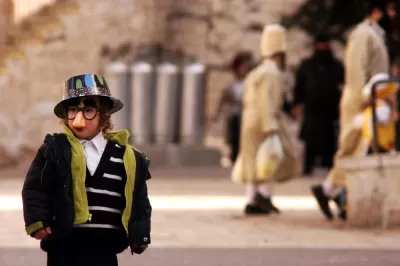A little pre-Purim humor (well, attempted humor anyway).

The Jewish holiday of Purim is this week—one of the few Jewish holidays that are actually more fun than solemn. On a related note, the University of Chicago has an annual tradition of the Latke-Hamantash debate. In these "debates," scholars try to make arguments (preferably ridiculous ones) about whether the latke (a potato pancake commonly eaten by Jews during Chanukah, a holiday that usually occurs in December) or the hamantash (a pastry commonly identified with Purim) is better. This year, a question occurred to me: Is there an urbanist way to do a latke-hamantash debate?
If I had thought of this a few weeks ago, maybe I would actually structure one. But since I didn’t, I’ll just try to do at least one side of the debate in print. So here is my intentionally silly urbanist case for the hamantash:
*There are three key factors in making a neighborhood walkable: density (because dense places are more walkable), diversity (of land uses, so people can walk to shops, parks etc), and design (for example, too-wide streets are dangerous for pedestrians). Similarly, a hamantashen is triangular, which means it has three points. Coincidence? Maybe, but what about...
*Sugar vs. starch. Latkes are made of potatoes, which means that they are basically boring—like the rural areas in which potatoes are grown. Hamantashen are more fun, like cities: they are full of sugar and fruit flavors, as well as the starchiness of baked wheat. And because hamantashen are not exactly an all-natural food, they require the economic growth that goes along with urbanization. Market urbanists in particular should favor the complexity of the hamantash over the simplicity of the latke. Eco-socialists fear economic growth, and hope to limit mankind to subsistence foods like potatoes, while only the free market could create the hamantash's intricate mix of flavors.
*The story of Purim is more "urban" than the story of Chanukah. Chanukah is all about a rebellion that begins in a small town in Israel. Purim is about palace intrigue in the city of Shushan, at the heart of the ancient Persian Empire.
*Purim ideally involves drinking alcohol, which is obviously much easier in a walkable big city than in suburbs where driving is usually necessary and drinking is therefore far more dangerous.
Does anyone want to make the urbanist case for latkes?

Maui's Vacation Rental Debate Turns Ugly
Verbal attacks, misinformation campaigns and fistfights plague a high-stakes debate to convert thousands of vacation rentals into long-term housing.

Planetizen Federal Action Tracker
A weekly monitor of how Trump’s orders and actions are impacting planners and planning in America.

In Urban Planning, AI Prompting Could be the New Design Thinking
Creativity has long been key to great urban design. What if we see AI as our new creative partner?

Cal Fire Chatbot Fails to Answer Basic Questions
An AI chatbot designed to provide information about wildfires can’t answer questions about evacuation orders, among other problems.

What Happens if Trump Kills Section 8?
The Trump admin aims to slash federal rental aid by nearly half and shift distribution to states. Experts warn this could spike homelessness and destabilize communities nationwide.

Sean Duffy Targets Rainbow Crosswalks in Road Safety Efforts
Despite evidence that colorful crosswalks actually improve intersection safety — and the lack of almost any crosswalks at all on the nation’s most dangerous arterial roads — U.S. Transportation Secretary Duffy is calling on states to remove them.
Urban Design for Planners 1: Software Tools
This six-course series explores essential urban design concepts using open source software and equips planners with the tools they need to participate fully in the urban design process.
Planning for Universal Design
Learn the tools for implementing Universal Design in planning regulations.
Appalachian Highlands Housing Partners
Gallatin County Department of Planning & Community Development
Heyer Gruel & Associates PA
Mpact (founded as Rail~Volution)
City of Camden Redevelopment Agency
City of Astoria
City of Portland
City of Laramie



























